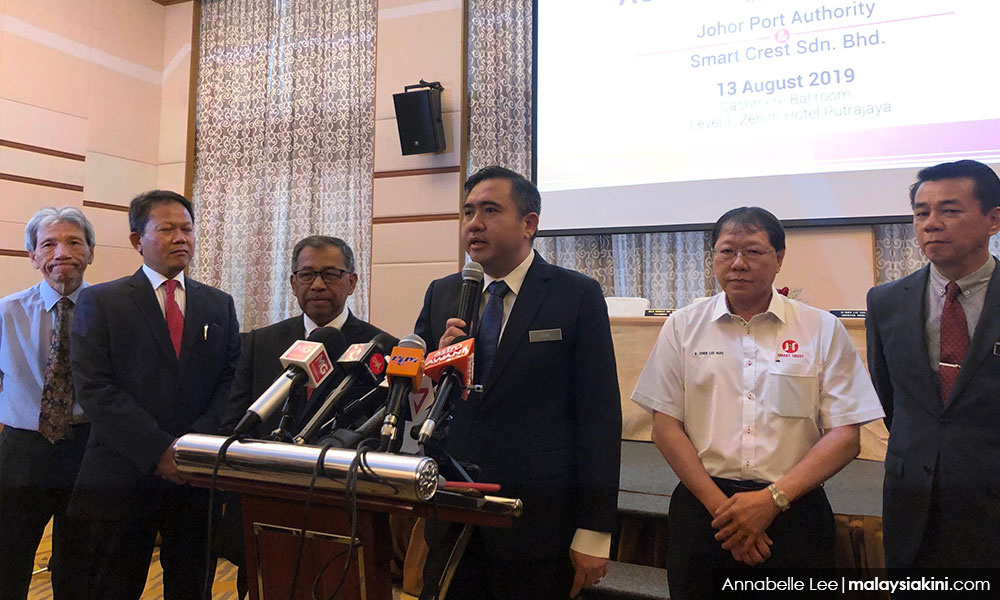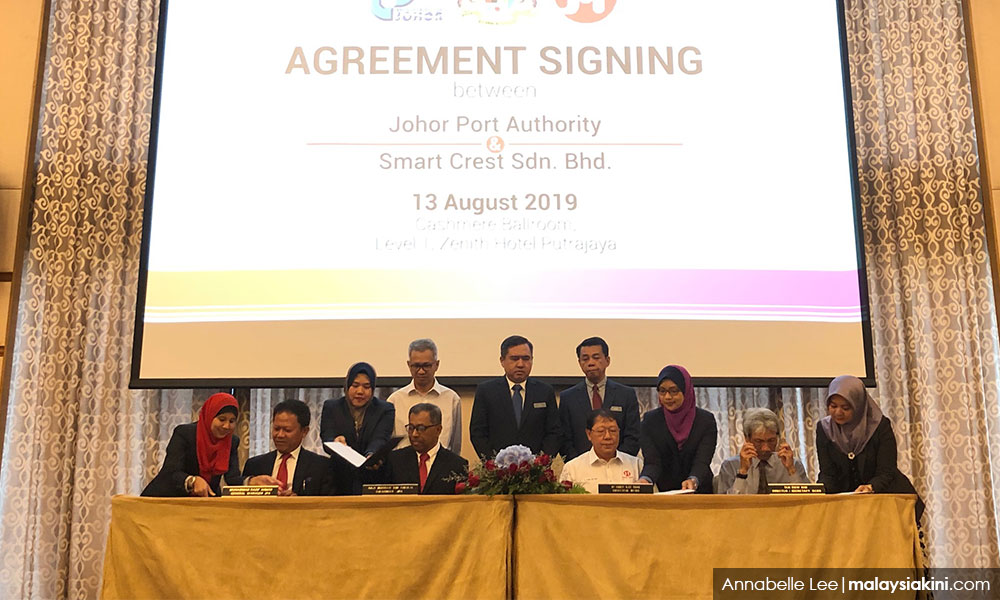
The long-abandoned Bunker Island project has finally been revived with the signing of a 30-year sublease agreement between the Johor Port Authority (JPA) and private oil and gas firm Smart Crest Sdn Bhd (Smart Crest).
The signing of the deal was performed in Putrajaya this morning and overseen by Transport Minister Anthony Loke.
Bunker Island spans 100-acre of reclaimed land off the coast of the Tanjung Pelepas Port in Johor, close to Singapore.
Constructed back in 2002, previous initiatives like the Asian Petroleum Hub failed to materialise and the artificial island was left idle.
Now armed with the sublease agreement, Smart Crest next aims to raise RM2 billion to develop an oil bunker facility for ships on the island by 2021. The firm presently operates an oil terminal in Westports in Port Klang.
Loke said the project will be fully funded by Smart Crest at zero cost for Putrajaya. He assured that the government would provide whatever assistance it could.
“As a pro-business government, we are here to facilitate (and) encourage investment [...] as far as the government is concerned, we will help in terms of facilitation, cutting down the red tape and overcoming all the bureaucracy,” he told a press conference after the signing ceremony.
As part of the agreement, JPA chairperson Rosnan Fathlal said the authority will be leasing the island to Smart Crest at RM500,000 a year for the first two years.
“For the first two years, we would like to give them an incentive,” he said during the same press conference.
For the subsequent three years, Smart Crest will need to pay RM2.19 million per year.
JPA will then charge an annual interest of 10 percent for the remaining 25 years of the lease tenure for Bunker Island.
Leveraging on Singapore’s market
Smart Crest managing director Cher Lee Kiat said the firm had first approached Putrajaya in 2016 with its plan for Bunker Island, but had hit a snag due to certain clauses in the sublease agreement which would have rendered the project “not bankable”.
They approached the Pakatan Harapan government earlier this year and managed to have the clauses amended.

Cher said the island will be developed in three phases, with the first being the oil bunker facility.
“The second phase depends on what our joint venture partners want to install, it could be Liquefied Petroleum Gas (LPG), crude or Liquefied Natural Gas.
“Diesel will be in the mix (too) because we will be compliant with the International Maritime Organisation’s (IMO) 2020 low sulphur regime,” he told the media.
The UN body will impose fines on ships using fuel containing sulphur higher than 0.5 percent beginning next year.
Cher said Smart Crest has thus far been in discussions with investors from the Middle East, China and Hong Kong about Bunker Island.
Cher hoped that the island’s location along busy shipping lanes and its close proximity to Singapore would work in its favour.
“Singapore is just a stone’s throw away, and their market is US$20billion per year for (oil) bunkers.
“If we are located there, we are confident to get at least 10 percent of the market (and) that is already US$2 billion.
“And we can compete with them in terms of cost, we are lower cost than Singapore, and even (in terms of) the floating storage we can also compete with them [...] we are landed and we are safer. Environmentally, we have less risk,” he said when asked further.
No other questions
Loke, who is also DAP’s organising secretary, declined to field questions other than those related to today’s event.
“This occasion is a signing ceremony, maybe we can limit it to this subject today [...] I don’t want to mix it with any other issues,” he told the media.
Among other things, journalists had wanted to quiz him on how Prime Minister Dr Mahathir Mohamad had branded Chinese educationist group Dong Zong “racist”.
Mahathir said this when asked about the group’s claim that the government’s decision to teach khat to Standard Four students was a form of “Islamisation”. - Mkini



No comments:
Post a Comment
Note: Only a member of this blog may post a comment.